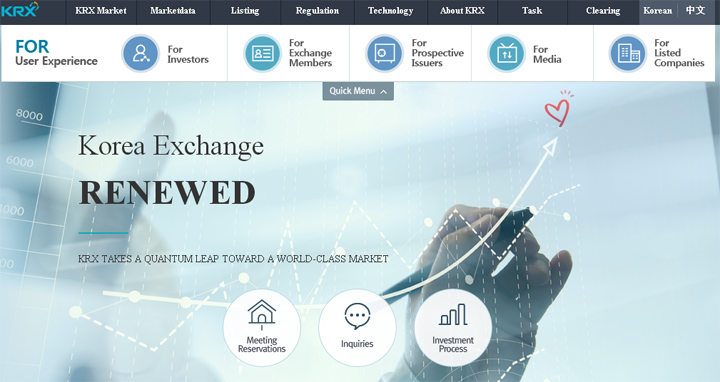Kosdaq, South Korea’s tech-laden stock trading board aims to attract at least 10 foreign companies next year as it eases regulatory barriers for foreign businesses.
Kim Jae-joon, president and CEO of the Kosdaq Market at Korea Exchange, told The Korea Herald that the board is seeking a handful of measures to appeal to promising overseas businesses from different countries.
The move to attract foreign companies in 2017 is part of the Kosdaq market’s effort to become a global capital market for technology firms.
From Jan. 2, unprofitable overseas businesses will be able to apply for listing on the Kosdaq if they meet one of certain qualifications.
KOSPI forecast to see 20 IPOs this year
South Korea’s main stock trading board Kospi is expected to see at least 20 new initial public offerings (IPO) in 2017 with a combined value of about KRW7tr (USD5.86bn), according to the Korea Stock Exchange (KRX).
The total value of the IPOs next year will overtake the KRW4.3tr of 16 companies this year.
Among the Kospi entrants in 2017 are Netmarble Games, Korea South-East Power, Korea East-West Power and ING Life insurance. Korea Hydro and Nuclear Power Corp, Kepco KDN, a smart grid technology provider, and Korea Gas Technology Corp are on the list as well.
The largest IPO deal next year is Netmarble Games, estimated to be around KRW2tr. However, Hotel Lotte’s between KRW4.1tr and KRW5.3tr IPO could be the biggest next year if it resumes, the operator said in a statement.
Two state-run power distributors are projected to be about USD1tr each.
S. Korea’s KOSPI posts world’s lowest volatility this year
South Korea’s benchmark KOSPI has posted volatility of 1.87 this year, the lowest level among stock indexes in 17 major economies in 2016, according to data released by the Korea Exchange and Shinhan Investment Corp.
A small number indicates that a stock market has neither risen nor fallen greatly. The key index has long remained in a range of 1,800-2,000 this year. A cavalcade of negatives at home and abroad pushed South Korea’s main stock index to lag far behind other emerging markets.
China reached 8.45, while Brazil, Russia and India posted 8.38, 5.09, and 4.94, respectively.
According to a Yonhap report, the benchmark index has posted a poor return as the bourse lost momentum.
The KOSPI’s yearly rate of return stood at 3.7% this year, 11th-highest among the 17 nations. Analysts said South Korea’s stock market has been negatively impacted by Brexit, Samsung Electronic’s recall, and Donald Trump’s victory in the US. – BusinessNewsAsia.com
